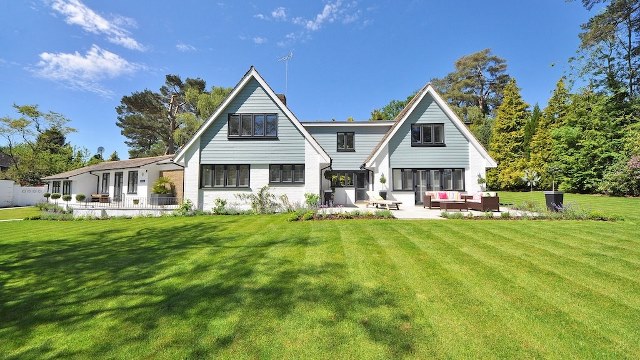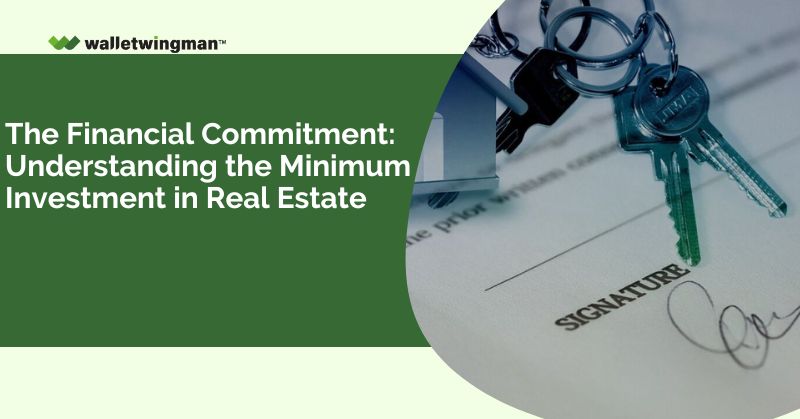Real estate is one of the best investments to invest your money in. As the sector recovers from the effects of the CoronaVirus pandemic, it’s expected to pick up within the next 5 years. The good thing is that even though the sector has slowed down, you can still earn a decent amount of money.
Some believe you must have enormous financial muscle to join the real estate business. But, in reality, you don’t need to break the bank to join the sector. The best way to start is with a minimum investment, which allows you to test the market without risking too much.
However, getting started with minimum investment in real estate is a challenge. Fortunately, you don’t have to worry anymore with this comprehensive guide. Read on to find out how to go about it.
Factors Affecting Minimum Requirements In Real Estate
As a beginner, your biggest worry is how much money you need to invest in real estate. Well, many factors affect the market. These factors influence the amount you need to invest in real estate.
Here are the key factors to keep in mind:

1. Property Location
The property location is a crucial factor that determines the price of a real estate asset. Properties near social amenities attract buyers faster than those in remote areas; hence they are highly-priced.
Investing in properties neighboring prime areas is ideal for an investor looking for minimum financial commitment. Such properties attract higher prices and sell more quickly than in undesirable locations.
2. Type of Property
Real estate offers different types of properties with attractive real estate portfolios for sale available online. You can opt for land, residential, commercial, or industrial property. Each of the properties has a varying minimum cost of investment. A vacant land will cost less than a developed one.
Also, if you are interested in residential property, it will cost you differently from industrial property. Evaluating different properties gives you insights into the best type of real estate for your money.
3. Purpose of Investment
The purpose of investment is another critical issue when determining minimal financial commitment. For instance, you can buy and lease or buy and sell (short or long-term). If purchasing a property, you must calculate the commitment cost and the time it will take to recoup it.

4. Property Valuation
Property valuation is essential as it will determine whether you are ready to enter into the financial commitment. Before purchasing, getting the valuation of the property is necessary. Factors like tax, listing price, insurance, and taxation determine the value of a property. Basing your investment on property value is always the best approach when investing in real estate.
5. Projected Profits
While looking for minimum investment opportunities, real estate rate of return is an essential factor. Since cash flow refers to excess money left after all expenses, property with positive cash flow is ideal. Conducting all necessary analyses to determine the worthiness of your investment is paramount.
6. New Vs. Old Property
New houses are highly-priced than old properties. The newly constructed homes offer more modern amenities and are easy to customize. This makes new properties attractive and hence higher prices.
Old properties are ideal for minimum commitment, but you also need to consider the renovation cost and projected returns.
7. Investment Type
These days, you can invest directly and indirectly in real estate. This allows you to determine the minimum investment amount you can commit. Direct investment minimum investment is usually higher than indirect investment. That is why an investor needs to evaluate the best investment method.
8. Your Credit Scores
Credit score plays a big part in deciding the minimum investment opportunities. When your credit score can’t allow you to access a big loan or mortgage, you can opt to go the indirect investment way. However, if you can access a mortgage financing plan, it will also allow you to enjoy a higher minimum commitment.
Real Estate Minimum Investment Strategies
If you want to become a real estate investor, you must hone your investment strategy. Here are some of the best ways to invest in real estate:
1. Invest in Real Estate Investment Trust (REIT)

Real estate investment trust offers beginners and unestablished investors an opportunity to invest in the real estate market with as low as $1,000.
REITs operate by selling bonds to investors. That means you don’t own the property; the responsible investment company owns or rents the property and runs all the operations. Instead, you get rewarded according to the shares held.
Many investors are going the REIT way since it offers more flexibility. There are publicly traded REITs available through stock brokers. Also, it’s possible to venture through real estate exchange-traded fund shares that earn interest.
2. Invest in Online Real Estate Crowdfunding Platforms ($500+)
Crowdfunding is sourcing money from many individuals to fund a project. Some companies are dedicated to offering investors opportunities by crowdfunding real estate money. Usually, the money is used to fund real estate projects, and each contributor is rewarded when the project starts generating income.
Although online crowdfunding is a fantastic way to get income, it’s crucial to do a risk assessment of the target company. Not every platform is safe, and you might lose your money. To ensure your money is safe, only use accredited platforms to invest in crowdfunding.
When done correctly, the online platforms are excellent. They usually pay investors quarterly, biennially, or yearly. Some platforms require $500, which is amazing for starters, while others only accept accredited investors with over $1,000,000.
3. Buy/Build Your House ($100,000+)
If you are in a position to buy or build a home, it’s one of the ways to venture into the real estate business. Property prices keep changing; once you have your home, you can sell and make some quick money when prices peak. Before embarking on this step, assessing the housing demand within the locality is ideal.
If you don’t have the cash to buy or build a house, you can boost yourself by getting a mortgage loan. Once the house is in your ownership and demand is high, it’s time to get rich. Although this strategy can be great, it is long-term and requires significant commitment and planning.
4. Venture into Rental Property Investment ($100,000+)
Venturing into rental property investment is a long-term strategy that requires planning and commitment. It’s expensive; you must invest substantial money to buy the property. Purchasing a rental can cost over $100,000, depending on the location.
Although buying a rental property is an outstanding achievement, it comes with an extra cost when you assume ownership. You will be responsible for tax, maintenance, and other emerging issues. However, when the location of your property is favorable, recouping the money spent takes less time.
When you buy a property, you can make it long or short-term. Long-term is for tenants staying on the property for an extended period. With the emergence of short-term rental companies, it’s also a way of making money on your property.
5. Real Estate Property Flipping ($10,000+)
You have probably seen a company that buys property, renovates, and sells at a profit. This is what is known as flipping in real estate. It’s one of the strategies used by some of the largest real estate in the US. The strategy can also perfectly suit people targeting minimum investment opportunities as you only commit to what you afford.
If done correctly, the strategy can give you good returns. However, it is also risky as it needs high precision when estimating the cost of buying and renovating. This approach is excellent if you are an expert in house building and want to start real estate.
Flipping is excellent for building and construction since you can cut the overall renovation cost. By cutting labor costs, you can expect to earn extra cash.
What Are the Minimum Investment Challenges?

1. Low Returns
People investing in minimum investments don’t enjoy huge returns like those with huge investments. This is because the dividends earned are much lower than investing in large amounts.
For instance, if you invest $1000 in a real estate scheme and pay the bonuses at 10%, you will get $100 after one year or the agreed period. Therefore, you must invest in the long term to accumulate good capital. Also, taxation and charges contribute to lowering earnings.
2. Market Uncertainty
Like in any business, real estate also experiences slowdowns. When there is a low demand for property, it can affect the investment. People with limited resources can find investing in the property market discouraging during this time.
3. High Charges
Companies offering minimum investment opportunities sometimes charge a high fee which discourages investors. Most small-scale investors join the minimum investment property market as they don’t have enough capital to enter the market independently. When the participation fee is high for beginners, it limits the number of people who can invest under this strategy.
4. Variations in Returns
Real estate investment, especially under REITs, doesn’t guarantee even returns. Depending on the company’s mode of operation, the payouts can differ year after year depending on the real estate business situation. Before investing, doing a risk assessment is ideal to know the suitability of your selected company.
Summary
Utilizing the existing channels and starting low is a proven way of becoming an established real estate investor. With the ability to invest small amounts, as low as $500, and generate income, you can climb the ladder to become a successful investor. This guide allows you to use the little you have to build yourself.


